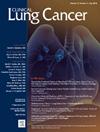The Role of GLP-1 Agonists in Mitigating Lorlatinib-Induced Metabolic Syndrome: Two Case Studies
IF 3.3
3区 医学
Q2 ONCOLOGY
引用次数: 0
Abstract
- •Lorlatinib-induced metabolic syndrome, including hypercholesterolemia, hypertriglyceridemia, weight gain, and hyperglycemia, poses a significant challenge during therapy.
- •Metabolic disturbances may not warrant lorlatinib dose reduction in mild to moderate cases, as they are often manageable with adjunctive therapies such as lipid-lowering agents.
- •Our cases demonstrate the potential of GLP-1 receptor agonists (e.g., semaglutide) to effectively address metabolic side effects, including weight loss and normalization of lipid and glycemic profiles.
- •A phase II clinical trial is warranted to rigorously evaluate the pharmacokinetics and safety of GLP-1 agonists in combination with lorlatinib, given their potential to enhance patient quality of life and long-term treatment adherence.
- •Oncologists should screen patients for metabolic syndrome prior to lorlatinib initiation and throughout treatment to enable early intervention and tailored treatment strategies.
GLP-1 激动剂在缓解洛拉替尼诱发的代谢综合征中的作用:两个案例研究。
•lorlatinib诱导的代谢综合征,包括高胆固醇血症、高甘油三酯血症、体重增加和高血糖,在治疗期间提出了重大挑战。•在轻度至中度病例中,代谢紊乱可能不需要减少氯拉替尼的剂量,因为它们通常可以通过辅助治疗(如降脂剂)来控制。•我们的案例证明了GLP-1受体激动剂(例如,semaglutide)有效解决代谢副作用的潜力,包括体重减轻和血脂和血糖的正常化。•考虑到GLP-1激动剂与lorlatinib联合具有提高患者生活质量和长期治疗依从性的潜力,有必要进行II期临床试验,以严格评估GLP-1激动剂联合lorlatinib的药代动力学和安全性。•肿瘤学家应该在开始使用氯拉替尼之前和整个治疗过程中筛查患者的代谢综合征,以便进行早期干预和定制治疗策略。
本文章由计算机程序翻译,如有差异,请以英文原文为准。
求助全文
约1分钟内获得全文
求助全文
来源期刊

Clinical lung cancer
医学-肿瘤学
CiteScore
7.00
自引率
2.80%
发文量
159
审稿时长
24 days
期刊介绍:
Clinical Lung Cancer is a peer-reviewed bimonthly journal that publishes original articles describing various aspects of clinical and translational research of lung cancer. Clinical Lung Cancer is devoted to articles on detection, diagnosis, prevention, and treatment of lung cancer. The main emphasis is on recent scientific developments in all areas related to lung cancer. Specific areas of interest include clinical research and mechanistic approaches; drug sensitivity and resistance; gene and antisense therapy; pathology, markers, and prognostic indicators; chemoprevention strategies; multimodality therapy; and integration of various approaches.
 求助内容:
求助内容: 应助结果提醒方式:
应助结果提醒方式:


